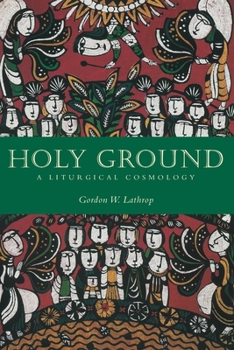Holy Ground: A Liturgical Cosmology
Select Format
Select Condition 
Book Overview
This latest work from leading liturgical theologian Gordon Lathrop explores the extent to which the central symbols and interactions of Christian liturgy yield, for their participants, a new proposal for their understanding and experience of the world. In the process, it considers various kinds of world-making, the diverse maps, and the differing senses of "cosmology" in which we all live. Finally, the book examines how certain liturgical reforms...
Format:Paperback
Language:English
ISBN:0800696557
ISBN13:9780800696559
Release Date:July 2009
Publisher:Fortress Press
Length:250 Pages
Weight:0.80 lbs.
Dimensions:0.6" x 5.9" x 8.9"
Customer Reviews
1 rating
Analyzes liturgy from a unique perspective
Published by Thriftbooks.com User , 18 years ago
Gordon Lathrop's book seeks to examine "the ways in which Christian worship may help us to imagine, understand, care for, and live in the world" (ix). Written in a style that is geared toward clergy and theological students, Lathrop seeks to enact a liturgical renewal in a "top-down" fashion by appealing to those who have the most influence on the actual structure and content of church liturgies. Throughout the book the goal of evaluating how liturgical practice should and does shape the personal cosmologies of all its participants is readily evident and forces the reader to consider the influence that the liturgy can have upon one's life. The book's introduction is a cosmological prolegomena that convinces the reader of the importance of the task at hand. The first section, "Liturgical Worldmaking", provides the philosophical foundation for Lathrop's liturgical cosmology, drawing on ancient philosophical cosmology and reorienting it in relation to the Gospel of Mark. This important initial section is referred to often in the rest of the book. The second section, "Liturgical Ethics", is the most practical of the three as Lathrop examines the ethical implications of baptism, Eucharist, and liturgical time. In each chapter, he offers a list of very concrete and practical suggestions for renewing and reorienting liturgy in order to reflect a more ethical cosmology. This section could be read as a stand-alone section, although its depth will be missed without reading Lathrop's first section of the book. The section could also be used after initial reading as a reference for ideas to transform liturgical practice. The final section of "Liturgical Poetics" seems to be the least helpful of the three sections; however, the beginning of the section contains a helpful and necessary caution in regard to how the liturgy could reinforce "cosmological distortion". A recurring theme in the book is that of a liturgical juxtaposition of cosmologies, which is expounded early in the work: "For the Scriptures, none of the various candidates for a central cosmic principle can be adequate--not the perfect sphere, not the ruling planets, not the conquering god, not the dominant role of humanity, not the end of time, not the Logos, not the Son of Man, not the tree of life. But the cosmologies suggested by all these can be received if they are turned, if their terms are reused to speak of the living God, if the community encounters that living God through all the gaping holes in their cosmological fabric" (44). This refusal to concede to a meta-cosmology is found throughout the book, along with other facets that point to the author's postmodern tendencies. Often Lathrop finds the power of liturgy within the mixture of two seemingly contradictory components: "silence is set next to speech, concrete symbols juxtaposed to lengthy discourse" (196). The real foundation for Lathrop's work is Plato's story Timaeus, which Lathrop says is the Western world'






